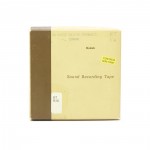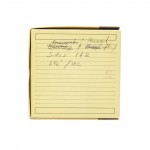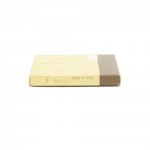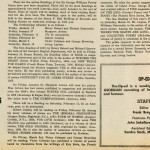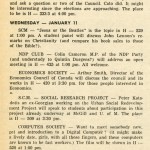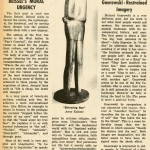Introduction - Roy Kiyooka
00:00:00.00
Ladies and Gentleman, um, let's see, what am I going to say? ...Well, glad to see y'all here. So first to Louis Dudek from McGill University will introduce to poets we're readings this evening.
Louis Dudek
00:00:40.82
I expected a longer introduction than that, it will be very fine. There are two kinds of readings that I like to attend very much, one kind is the sort that they're having tonight at McGill University, where well established poet who has been on the scene for forty or fifty years comes to read. Over there, it's A.J.M. Smith from Michigan State, Canadian anthologist and well-known poet. With a poet like that, really makes no difference what he reads or how he reads it's just important to see him and even the tottering saint can perform miracles on occasions. The other kinds of poets I do like to hear very much are the sort that we'll hear tonight, Gnarowski and Beissel. The McGill publicity department sent out a notice about A.J.M. Smith and described him as well-known Anthropologist of Canadian poetry. Actually, they corrected it in ink, they made the mistake twice though, probably a typist error. But they didn't know how correct they were, with the current scene in Canadian writing, there are primitive types around that are hard to classify and we need anthropologists... Well, Beissel and Gnarowski are not of this breed of poets who seem to have lost all sense of poetic organization or form, where you think that conventions, poetic conventions have been abolished and what is left are chaotic bits of internal monologue on the page. Of course, that kind of school may be very interesting to watch to see what comes out of it but at present, having watched it now for a few years I'm a little impatient often and tired of the magazines where this material occurs because it seems so easy to turn out and anyone has these bits of chaotic monologue going on. On the other hand, there are many poets still writing who are not following the conventional forms of English metrics and rhyme and so forth, who are turning out poems or at least watching what happens what happens with the words on the page and both the poets we're listening to tonight are of this kind. They are very careful craftsmen. Henry Beissel has the long list of achievements to his credits already, but two on that list strike me very much. One is, amongst many of the posts where he's taught, one is the University of Alberta is the kind of political stir that was created on the campus when his magazine Edge was brought into the classroom by one of the professors. That is, his poetry contains, content that can make one think, that is morally committed to certain issues in today's world. He's very strongly a moral poet on one side, and the other item in his biography is his new book, which has just appeared New Wings for Icarus, which is extremely aesthetic at the same time that it is meaningful in this way. His poetry seems to combine two things, one is a moral urgency and on the other hand, at the same time, a romantic sense of language and of imagery and of emotion that goes with that, which are all very, very promising characteristics for a beginning poet, but I think that this New Wings for Icarus book is his first considerable book. So, without more ado, I introduce to you Henry Beissel.
Henry Beissel
00:05:30.00
When I considered the kind of poems that I might read this evening and the order in which to read them, I was thinking of the condition of this hall, as it was the last time I was here and I therefore chose two poems, which I wrote in the West-Indies. They celebrate the sun in an ambiguous sort of way, I'm going to read them all the same, despite the fact that the conditions have changed. I don't know how much you need to know about the West-Indies, I'm hoping—oh—
Annotation
00:06:15.00
Audience member speaks, unintelligible.
Henry Beissel
00:06:17.00
Is this any better? Is there someone in the hall who can attend please to all this?
Annotation
00:06:35.00
Audience member speaks, unintelligible.
Henry Beissel
00:06:39.00
Well I'll try to speak a little louder on my own, in spite of the microphone. I was saying that I don't know how much one needs to know of the West Indies to respond to this sort of poem, I'm hoping something of the West Indies might be in the poems, the first is called "Pans at Carnival". Pan is the expression for a steel drum. The imagery in the poem is taken entirely from the steel drum and its use at Carnival, a feast that is about to be celebrated in Trinidad in about a month. Rhythmically, the poem tries to catch something of the rhythm of the steel pan.
Annotation
00:07:28.00
Reads "Pans at Carnival"
Henry Beissel
00:07:30.00
Steel voice of a steel god
commands the groined shuffle and shake
man beat man beat she hard
holy rum and roti host
up and down the profane aisles
of this tin pan city
clinking, clanking,
pilgrimage in disguise
to cleanse the past from terror
and from fury, what is to come
ringing in
the tympanum of a tin god
the blood hammering by heart
forges wrought shapes of music
hot from gaudy steel
on the anvil of ancient passion
to road march this tin pan city
clinking into the savannah
of its clanking nightmares
in honour of the black sun
bottled in one million groins
shaking out
the crumpled world of another year
wasted—oh man hold she tight
the world, for forty two hours caught
in the sphere of a steel drum
with it's continents embossed in time
with its people one and divided
in the shuffle and the jump-up
on the tin belly of some god
blessing with cane and cocoa
cursing with cutlass and pride
beating time
creation from oil drums
of a world of sweat and laboured
masks obeying the ten metallic
commandments revealed in burning
rhythms on a mountain of flesh
from which leave is to be taken
by a grand public assent
clanging up Henry Street
down rum and roti
the steel god the groin the black
sun beat man [REC: beat man!]
[Published in: Beissel, Henry. Face on the Dark. Toronto: New Press, 1970]
Henry Beissel
00:10:18.00
The second poem celebrates something of the violence that the sun, with which the sun blesses those parts of the world, from which it never really disappears.
Annotation
00:10:34.00
Reads "Where the Sun Only"
Henry Beissel
00:10:39.00
Life is cheap and death still cheaper
[REC: where the sun only is their keeper.] [PUB: where the sun is their only keeper.]
Hibiscus bushes stand like exhibitionists
their flies undone: where two fellows
hold down the schoolgirl with the great fruit breasts
who followed the hummingbird too far
the third becomes a carnal hibiscus
and each one takes his turn naturally
banging his flesh home to a whimper.
Life is cheap and death still cheaper,
[REC: where the sun only is their keeper.] [PUB: where the sun is their only keeper]
Palm leaves throw black skeletons
into the bleached sand: where the cutlass rages
keen as a palm to chop the face
[REC: that touched the arms that held the thighs that rubbed the girl too lovely] [PUB: that looked at the girl that moved the hands
to touch a smile a feeling too fragile]
for a friend, he falls by the fierce shadows
to bleed his desires softly into the sea.
Life is cheap, and death still cheaper
[REC: where the sun only is their keeper.] [PUB: where the sun is their only keeper.]
[REC: The scorpion hides his sting by day,] [PUB: The scorpion hides his poison by day]
where bananas grow: a bunch of children
[REC: trapped by the swift dusk, watch yet another father seed the womb in which they grew and their wondering eyes grow big with fear of the bitter food that burnt their baby sister into oblivion.]
[PUB: trapped in the big ambush of their eyes // bury their dead brother and watch a stranger // sting the womb in which they grew hard
into another screaming fever till at dusk // the light runs amok in the jungle of the blood.]
[REC: Where the sun only is their keeper // life is cheap and death still cheaper.]
[PUB: Life is cheap and death still cheaper // where the sun is their only keeper.]
[Published in: Beissel, Henry. “Where the Sun Only.” Poems New and Selected. Oakville: Mosaic Press, 1987. 47.]
Henry Beissel
00:12:49.00
Next I want to read two parts from New Wings for Icarus. Time does not allow me to read the whole poem, because then I could read you nothing else. Icarus is a poem that is written in four parts, it is with some regret that I read only two, because to me it is like playing the second and fourth part of a symphony, but there is no alternative.
Annotation
00:13:19.00
Reads "New Wings for Icarus" Part 2.
Henry Beissel
00:13:29.00
In the one-two domestic goose one-two one-two step
of our left-right modern one-two times one-two
we march left-right Christian --
Henry Beissel
00:13:51.00
Sorry, I'll start again. This is a hard one to read and this print is very small. I better hold it closer.
Annotation
00:13:59.00
Reads "New Wings for Icarus" Part 2.
Henry Beissel
00:14:01.00
In the one-two domestic goose one-two one-two step
of our left-right modern one-two times one-two
we march left-right singing one-two
onward left-right Christian soldiers
lift up your one-two hearts and legs
and rifles up up up cocked and down
with the foe we kill for [PUB: Christ] [REC: Christ’s sake!] one-two
hallelujah we’re on the move again
left-right one-two to New Jerusalem
is just left-right around the corner
we are all brothers, big brothers
serving one-two times in battle dress
we must all stick together
god-fearing, law-abiding
swelling together our ranks and numbers,
swelling our pride swelling our purse
swelling breasts, buttocks and bellies
one-two one-two one-two swollen privates
pick ‘em up, brother, up up, up
pride of disney and mother-
land up to his knees
in bible blood and imperial oil
recruit one-nine-eight-four
defender of the new left-right
faith in international business
machines [Audience laughter], brave for the new one-two
world of baptized walkie-talkies
left-right of course there is always
one-two the human one-two, element
cream of emoton [sic], faith tranquilizer
hope salts, charity pills, love shots.
don't hug that gun like a girl, man
one-two left-right one-two
the girl who loves a soldier is part of
the grand cavalcade it all adds up to
nineteenhundredandeightyfour
answers to a single question
what d’you think this is?
a fucking funeral parade?
quick march one-two one-two
threeandahalf die every two seconds
ten are born every three seconds
twohundred ejaculations per minute on target
to say nothing of the intercepted ones [Audience laughter]
ebb and tide of semen and sand
on the bluff shores of time
which way to turn for escape? a
abooout [PUB: sic] face! one-two one-two
nineteenhundredandeightyfour
questions and a single answer
the old man's army is the best goddam
fightin’ machine there is, get it?
triumph of law and order—of the jungle
and of mathematics, regimental orders
regimental colours, regimental prayers
in nomine patriae one-two left-right, et ficti…
[REC: And we stand helmet in hand wondering how to pray, waiting for something to be written on the blank pages of our minds, waiting for words to put to the music we hear faintly in the stillness inside us. This is no time for prayer or song over the roar of a million machines, over the blare of a billion explosions. You wouldn't be heard even assuming there were anyone to hear. But the birds on the wind-swept bows of their little lives know better. Know the worm under the grass the cold of winter and the duel of love and everything is occasion for song. Pythagoras took the cosmic music vox box to pieces and found all things and intervals in space and their measurer in time music. Because music declares the design of creation I would have us sing, words or no words, out in the streets of New York, down by the docks of London, up on the hills of Rome, herald the golden sphere of our song into the iron teeth of the ubiquitous monster with its tongue and eye and brain, wired to the plastic buttons on a million chromium-plated breasts, and that, is prayer enough.]
One-two one-two left-right
where do you think you're going, buster?
we don't know where we are going
until we're there
earthbound astronauts moonbound
prepare to do or die
going left-right in circles
masked and one-two caged
going to visit
Venus Mars Jupiter
dead gods in orbit
going to bury them?
or resurrect them?
No-one's in the know
going because one-two
we must be going left-right
once we're on the go
only who has eyes to be blinded
cannot see that one-two
the object is immaterial
we are on the road to anywhere
sicut eritis Christ! a pack of dogs
that's what you are
pick ‘em up one-two one-two,
or I'll have you on your bloody hands
and knees one-two left-right
onwards upwards downwards
we never say die
though the birds have long known
that we are not at home in the air.
the fish have watches us drown often
enough and a child learns about fire
remains [REC: the] earth
to which all must return
the earth remains.
[Published in: Beissel, Henry. New Wings for Icarus. Toronto: The Coach House Press, 1966. 17-25.]
Note: Second publication of the poem in 1987 reveals that the added verse in the recorded version is a later addition to the poem.
Annotation
00:19:41.00
Reads "New Wings for Icarus" Part 4.
Henry Beissel
00:19:46.00
Behind the flowering hedge of a dream
where now all is said
and done, an amourous boy
aims his bow and the arrow
with a quiver sticks in the heart
each time to bleed us
softly till we lose our senses
till we run out of questions out
of answers out of our stone
and steel labyrinth [REC: in] [PUB: into] the arms of
a sleeping princess waking
to your kiss and mine. With her
we dance to the music inside us
over spring hills and through autumn
valleys up and down
summer winter round
and round the ancient ceremony
of fire and earth, air and
water as it was in the beginning
when everything manifestly mattered.
No fancy this flight and no sun
can melt its fancy wings
though in the mortar of time
he will pound our cities to dust
even before we have reached the dead
end on the highway of all flesh.
The heart beats the rhythm
that rules our step and the princess
of the rose-garden and the crown of thorns
leads us through the cryptic figures
of the dance wherever you or I
invoke her—at dusk in the hands
and knees chess games of passion
truly or falsely, for a few pieces
of silver, or in the dawn of rosy-
fingered adolescence, the bed
creaking, the birds singing,
the flesh swinging from a tree,
or at night, along between tight-
lipped tears against the limp
cheeks of a pillow, or in the gutter
retching biliously with midnight
despair, or at high noon of battle
or labour, guts or babies
breaking unguent from our bellies,
or on our knees between crooked hands
bent in the shadow of the a belfry.
Never is her name taken
in vain: whispered in good
or bad faith, screamed,
spat out with a sneer or puffed
in the locomotive breath of coition—
always she is willing over spring
hills and through autumn valleys
up and down summer
winter round and round
the ancient ceremony of fire
and earth air and water
as it was in the beginning.
Father, you who are not in Rome's heaven
Where every cloud has a lining of gold
and where ex cathedra, the planets are seven
Deadly sins, but you who made man of old
In bronze and made his image manifold
In a tower at Babel, at London in a jet
Over New York—teach me never to forget
How we built a cage for the human beast
That he should be going in circles as long
As he lives to find no way out at least
[REC: By] [PUB: Of] the elaborate [Note: sentence is re-read with the correction ‘of’] confinement along
The silver threads of his age, how headstrong
The king at the mercy of all his men,
and how we did escape beyond his ken.
Father, you who fashioned from love the wings
With which I beat the air out of desire
To rise beyond the beast's howl and the king's
Command know my will is done in the gyre
Of the ceremonial dance by fire:
Bless my flight whose feathers are bonded fast
With the stuff of dreams that can never last.
Even assuming there were anyone to hear
in the stillness inside us or out
in the black sea between stars
who but you and I [PUB: can]
know glory and eclipse
of the blood rising in the rosy-fingered
dawn of the flesh rising
in the fire and water sky
of the mind setting west
of all our gardens of all
our dreams. Flesh wings
wax feathers canvas
steel—the substance is immaterial
of human flight whether it probes
the searing wound at the thigh
behind the eye
in the sky:
always it traces the unknowable
draws a design for creation
tests the impalpable obscure
for god. We are what we know not
we have always been. On the grave
yards at midnight of our cities
centuries of lovers gather
to mock the passing of time
that once mocked them [REC: Plumaged memory of his run-away bride and finds words, here and there, music and everywhere, no rest. His song, his ancient, guttural song goes golden and unheeded out in the constellation of Pegasus to rise where you and I will fall and to render us human, for the one night in which we bloom.]
[PUB: out of malice // out of mercy out of breath // on the highway of all flesh. // Along its shoulder the blind // sorcerer taps his way // from age to age from fair // to fair market his unwanted // vision of the candle and the moth, // the flower and the butterfly, gropes // for the plumaged memory of his runaway // bride, and finds words here // and there music everywhere // his ancient guttural song // no rest. His song // goes golden and unheeded out // in the constellation of Pegasus to rise // where you and I will fall // and render us human // for the one // night in which we bloom.]
[Published in: Beissel, Henry. New Wings for Icarus. Toronto: The Coach House Press, 1966. 35-45.]
Note: Second publication of the poem in 1987 reveals that Beissel reads from a later version of the poem. Note the similarities in the last stanza between the recorded version and the 1987 published version, and the differences in the majority of the poem.
Henry Beissel
00:26:39.00
Now for a little sort of relaxation in between, I find unrelieved serious poetry hard to bear myself, I'll read-- unfortunately I do not write occasional poems terribly often, they always seem to grow into something much bigger than I can handle, but the next two poems I want to read you are occasional poems, poetry can come out of anything of course, and this one came out of an encounter in a house of Inquisition in Cartagena, in Columbia, it is really self explanatory. It's called "En la Casa de Inquisición"
Annotation
00:27:40.00
Reads "En la Casa de Inquisición"
Henry Beissel
00:27:42.00
It is not easy to be a hero
in a court of inquisition:
I was tortured
to confess to what [REC: I did not do,] [PUB: I never committed]
[REC: pleaded] [PUB: to plead] for acquittal
in a thumbscrews of remembrance
[REC: screamed] [PUB: to scream] for audience tongue-torn
with the dark princes of Andalusia—
when you crashed through the window
of my eyes with an armful of faith and laughter.
You asked nothing but my name
and gave me yours, Petra,
to challenge my tormentors,
to break Dominican and Jesuit
rack chains stake the power
of unholy place—you gloried
in my defiance of the tourniquet
of the god of damnation
of the frocked henchman
in the conclave—you did not see
the murder—you did not understand
it was the flowers of your laughter
the greenness of your faith
made the garden,
where I appeared a bright prince
in the palace of our unkissed kiss
with which you disappeared forever
in the alleys of the burning town
I was tortured to confess
how easy it is to be a hero
en la casa de inquisición
amorosa.
[Published in: Beissel, Henry. “En la Casa de la Inquisición.” Faces on the Dark. Toronto: New Press, 1970.]
Henry Beissel
00:29:23.00
The next poems leads me on to the last set of poems, but you won't discover that until you hear the last two poems. This poem is dedicated to my daughter, when she was 1 and a half, the first stanza deals with the circumstances of her birth, which were somewhat elaborate, there were fireman. The second stanza deals with her present-- this would be the past from the time of the poem, the second deals with her present, and the third with her future.
Annotation
00:30:07.00
Reads "To My Daughter at Age One and a Half"
Henry Beissel
00:30:13.00
[Note: Published and recorded versions are so different that for the sake of clarity, both versions are available separately]
[Recorded Version: line breaks are not included]
Angels slid down the golden banisters of the early sun—No! Fireman they were summoned to your cradle helmeted, gumbooted to light the fires of your life and terror exploded in your heart. You knew birth as death, lunged for you wrenched from the thigh, bruised, broken, torn in the merry month was the dream was love, and we came in the dead of the womb to make you cry at this world. Up and down stairs, streets, wheels, of fortune but now you strut about, your unforgotten terror eager to touch, taste the unknown discovering Americas of attention and 'Dada's' and tears, above all things, intense, capricious, every thing is sudden, real, oh for the mystery of bits of paper, the blue fiend in the foam rubber mat and music, which sways you in time, charmed, you grope in the mirror for the black grapes of your eyes with the first blood, already, innocently on your hands. How could you know what happened? It's the applause now, even as the curtain rises for the set, the actors, nameless, the masks of folly and greed are our faces, really. Poor Tom and mad Ophelia, make you know, in this play, grief's a fool, make us human, good and evil, the footlights burn, joy's in beggar's weeds. This is your stage, the manager is out for coffee, the director, drunk. It's your play, your part, your gifts, you, in act here, for better or worse, alone, the world.
Note: 1987 publication of the poem differs from recorded version version reveals that Beissel reads from a later version of the poem. Note the similarities in the last stanza between the recorded version and the 1987 published version, and the differences in the majority of the poem.
Henry Beissel
00:33:25.00
And now I come to the final two poems. They belong together and are part of a-- we agreed not to torture you and not to read for more than 30 minutes this evening and I am trying to stick to that. This is rather the beginning of something that I may never live to finish, the entire thing is supposed to have some 26 poems, of which you will hear the first two, one is a prologue and the other one is called "Adam Enter Eve". In the prologue, a character introduces himself who is to play his part in the rest of the poem. It's not really a dramatic poem, although it's, well I don't think of it as a drama, although it has dramatic qualities. Anyway, I don't like to be my own critic. I prefer just to read you the poem. The whole cycle will be called "The Dancer from the Dance" that is as you no doubt know, a quotation from Yeats.
Annotation
00:34:45.00
Reads "Prologue" from "The Dancer from the Dance"
Henry Beissel
00:34:49.00
I step before the curtain of my eyes
to tell an ancient tale - that you all know.
—Don’t leave! I tell it in a new disguise.
It is the scare that matters, not the crow.
And scared [REC: you will] [PUB: you’ll] be if you but lend one ear.
A host of characters make up this show
and I impersonate them all. I fear
[REC: you will ] [PUB: you’ll] not mistake me. You have your looking-glass.
I am the king, his queen, her cavalier;
I rule, I flatter, serve—but not alas
myself. They pierced my feet at Thebes and broke
my bones in France, they tore my genitals
at London and my tongue while it still spoke,
an eagle ate my liver until
in Egypt my head was severed with one stroke.
And yet, you see, because I saved my skin
I live. The mask alone is my true face
I am what you might call a harlequin,
and though [REC: I am] [PUB: I’m] everywhere in disgrace
I will, if you be patient, make you laugh—
as Troilus laughed when he looked down through space
and saw the Trojan prince die for his love.
You think the earth is round, I know it's flat
[REC: and drink to that,--sorry. [Re-reading last few lines] You think the earth is round, I know it's flat] and raise my voice and sing to that still calf
in the moon who is my love. —Enough of this!
I bow, I do not scrape, my words do that.
[Published in: Beissel, Henry. “Prologue” Faces on the Dark. Toronto: New Press, 1970.]
Annotation
00:37:04.00
Reads "Adam Enter Eve"
[Note: unable to find a published version of this poem. Line spacing is unavailable so the poem appears below without any line breaks and with assumed punctuation.]
Henry Beissel
00:37:10.00
See the morning mist melt across the landscape of my legendary dreams. And from the first light, watch the east wind braid the gold streams of your hair and in my solitary garden, champagne upon its breath, launch a thousand ships and [Inaudible name Dante Alliguere?]. What creature are you to dare correct a universal order? Your features mirror mine softly, more mysteriously, kindling flames no fire knew. I want to know you, being in this garden, know how you came here, between the sun and the moon, know why you came here to inflict this piercing wound. I have dreamt your face before my head on a slab of stone. You, on the heavenly throne, dream of a Hebrew troubadour. I called for you in the dark though I did not know your name and I took you into the ark where a God put us to shame. I want to know you now and then and forever. Mount the heights of your beauty up the ladder of my soul, goddess surely of this whole lordly creation. You have his lordship's number, haven't you? A for Adam, Z for Zeus, stroke 01123 will put you through to him direct in many mentions where he sleeps his way to wisdom. Its dreams give him a start in life and a finish. You see this girl here, nude, most noble dream of all, instrument of real good, living him to love and beauty, mystic manual of heaven, signpost to eternity, divine incarnation. Oh, the very idea recalled Plato at the school and Master Aristotle kept the ball rolling, till the Medici took over, long after a pigeon had managed to fool Joseph. Virgin supreme, now don't get me wrong, he'll mount her heights alright. His Faustian quest for knowledge worthy of a man will claim him and she will do, fair creature the rest. No need to take the whip, I can assure you to the best of all possible creatures, the small [inaudible] the broad-hipped sex is quite tame if you tongue them sweet like a troubadour. Note his lordship now, at his favourite game, flattering himself to seduce his dame. Like a pilgrim I come to worship your eyes, pools of jellied skylight, your lips are cherry butterfly, your breasts, velvet-stalked moon-stone fruit, only Botticelli knew your hair and the magic of your lustrous skin works now and only under my touch. I want to make you a temple of this paradise, ritual of stars and roses, an altar of my hands and lips, a sacrifice of blood. Because I love you, I shall rip thunderbolts from heaven and hurl them to crack mountains and divide the sea to make your journey smooth. To make your journey safe, I shall battle the seven-headed monster and tame tiger and lion ‘til they lie at your feet. Because I love you, the forest song moves on birds' wings and the fish, with their wet mouth kiss the soft belly of the sky. Now I know you, utterly, Aphrodite and know your name, Friar, know why you came, Eve, to complete a universal order. Or the wound in my side, piercing without pain blood flowing, not of the lamb, blood purified by generations, washing away inside the world, death or divine incarnation, yours are seasons and years, sun and moon and spheres, the whole creation blessed. Because I love you, I am. Cartesian Christ, he loves therefore he is, up in lustrous arms, about creation. Listen, all the springs of centuries creek on his first and last leg to incarnation. The only leg his love has got to stand on. Look at him, the conqueror at worship in his temple. Alexander and his prostitute, or at Moscow collecting heads of men and maiden, or his godship, mistressed and evangelled [?] far out at purple sea of pagan blood and poisoned papal wine. Indeed, his worship wants respecting. Five dark continents, filled with Madonnas, raped, ripped and roasted in every style of piety and adoration, mind can conceive or scriptures induce. He's gone to war for love, for love is war. A kind of cannonball and trench-affair. You dig in after the age of knighthood when you're mounted, till you conquer or are conquered. Degas-drawn [?] to the bloody end through thick and thin or with Washington, hygiene and swagger your finger poised on the button divine to push but never pushing. A fine pickle, this much you can say for Adam, once a hero, always a hero and madam is his fatherland. One-armed Ninson [?] knew, but that Greek corpse-lover had a soft spot in his feet, which is why he got there too late. He did all the same, and sans-culotte his duty. Armar Mirunkar [unknown latin phrase] you have my meaning, sweet ladies? May now just so many breaches of promise until you give them bearing, pull down their pride at homonym. Goats and monkeys marvel if you will and can that you wished heaven made you such a man. The flowers in this garden burn like multicolored candles and all the leaves are builds [?] at this wedding of our soul. For this ecstasy, God's come to you disguised as swan and bull and swain, for this ecstasy I shall serve you truly until I die and rise again. For this ecstasy has made us mortal and immortal at the pain of death. Heaven is our banquet hall, though we know not the guests at the round tables of the stars. Is that Dionysus raising his tanquered [?] the moon there, to you, Artimus? Or is it Osiris, silver-eyed, toasting Isis? Let us bid them join us, the night is long and haunted by the future a fantastic symphony scored for all the instruments of love. Come, this dance is ours and we shall make it last the whole night through, to confound this universal order. We shall not be trees again. Come, let us feast and celebrate, it's our love makes heaven of this garden, and you Queen, over this green mystery. There once was a man and a woman who took their champagne with El Buman. [?] They first got undressed, I can't tell the rest, you see, our King and Queen were never dressed. Since all the leaves were bells, they could not hide their shame but rang it out instead. Oh dear, I guess that's why Van Gogh cut off his ear, I'm serious, the instruments d'amour are keen and cut wounds deep enough inside to call for resurrection which is a [inaudible] way to heaven as Rachen [?] found out after church and that subtly knotted divine before. Believe you me, this is no time for laughter, when Gods get drunk to celebrate a pair of humans. Next they'll better their heads or bash their hearts. One isn't safe anywhere. A castle nile [?] is what you need, watch our lord take his Isolde there to serve her unto death as bluebeard did his love, he pines for her when out of sight, sweet love, he plays his lute, all through the night, eternal love. Until [inaudible] ecstasy, the seven throws for the ceremony for all the swans and bulls and swains to gloat and toads to serenade them from the moat. Come ladies and gentleman, it's our feast lets join the fun backstage. Here, this way please. In passing, see this portrait of this Queen done by a Spaniard using his penis for a brush, enough to turn any green bride red. How true to live the whole scene is the way she lies there, naked beauty on the weak line, a goddess contemplating creation. She made Hyperion of Adam and he's been celebrating the elevation since on her, he laid his eyes. We are such stuff as love is made from. This way, watch the passage [inaudible] some light it's dim. Don't let the masks give you a fright.
[Unable to find the published version of poem]
Annotation
00:49:40.00
End of transcript.


